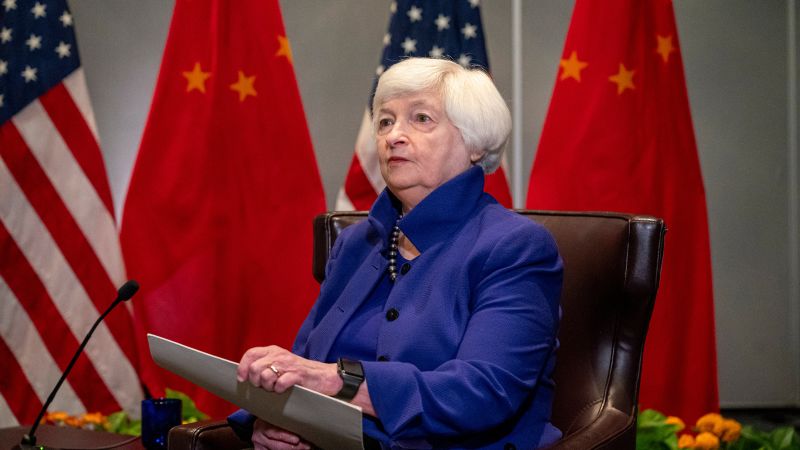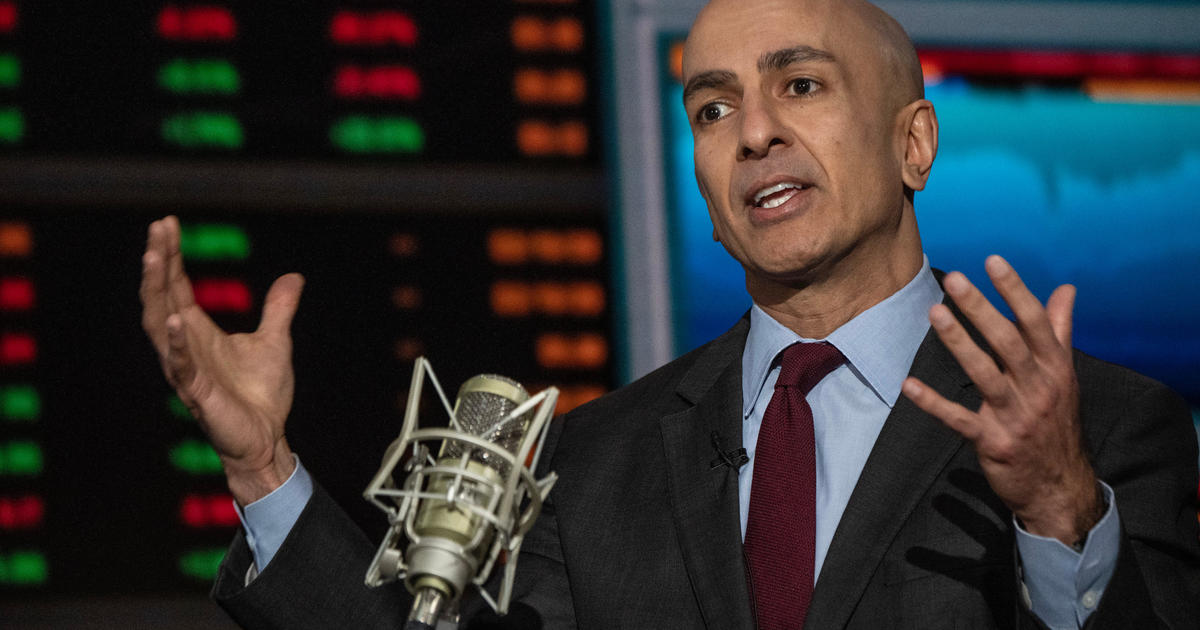US Treasury Secretary Janet Yellen is on her second visit to China and is expected to address the oversupply of Chinese goods, such as electric vehicles and solar panels, which has become a major concern in the lead-up to the US presidential election, as well as China's shift away from a market approach and its use of state subsidies for manufacturing industries; however, analysts believe that Beijing is unlikely to change its economic policies.

Japanese households are cutting back on spending due to sticky inflation, with outlays decreasing for a 12th consecutive month, although spending rose slightly from the previous month, indicating the impact of rising prices on consumption patterns.

U.S. Treasury Secretary Janet Yellen begins talks with Chinese officials on the challenges of China's excess manufacturing capacity and the impact on the business climate for U.S. firms, raising concerns about overproduction and the need for a "level playing field."

Chicago Fed President Austan Goolsbee suggests that housing inflation will play a crucial role in determining whether the Federal Reserve will cut interest rates this year. Goolsbee emphasizes the need for progress in housing inflation in order to reduce overall inflation to the Fed's target of 2%.

The timing of interest rate cuts by the Federal Reserve may not be as imminent as expected due to uncertainty surrounding inflation, according to comments from Fed officials; geopolitical tensions, rising oil prices, and concerns over inflation are contributing to market volatility and a sell-off in stocks.

Asian markets are likely to be influenced by a late reversal on Wall Street, geopolitical tensions, and upcoming economic data, including the Reserve Bank of India's policy meeting.

The possibility of no interest rate cuts by the Federal Reserve in 2024 has deflated Wall Street's expectations, as a Fed official questions the need for rate cuts if inflation remains stable and the economy continues to grow, causing concern for investors.

Richmond Federal Reserve President Thomas Barkin is closely monitoring the breadth of inflation across goods and services and believes that slower price increases need to be more widespread before he is comfortable cutting interest rates, highlighting concerns about the persistence of inflation and the need for progress in taming it.

The Federal Reserve expresses growing concerns about inflation, leading to uncertainty about rate cuts and a sharp reversal in the markets.

Minneapolis Federal Reserve Bank President Neel Kashkari believes that if inflation remains stagnant, there will be no interest rate cuts from the Fed this year, causing US Equities to trade lower; however, BNY Mellon FX & Global Macro Strategist John Velis believes that a rate cut is still possible in June if inflation data supports it.
On April 5, 2024, key events to watch include the release of the March Jobs report, insights from the Federal Reserve, Treasury Secretary Janet Yellen's address to the US business community in China, and Apple supplier Foxconn's sales figures for March.
You can watch live shows on Fox News and Fox Business Channel, with programs such as Varney & Company, America's Newsroom, and The Faulkner Focus.

The cost of groceries has significantly increased due to inflation, with shoppers now needing to spend $137 for the same basket of staples that cost $100 in 2019.

President of the Federal Reserve Bank of Minneapolis, Neel Kashkari, stated that if inflation remains sustained in March, the timeline for interest rate cuts will be pushed back, questioning the need to cut rates at all this year.

China is the largest bilateral creditor to low and middle-income countries, and the list of the 20 countries most in debt to China includes Argentina, Mongolia, Brazil, and the Republic of the Congo.

Stocks declined as investors considered comments from Federal Reserve officials and the potential for interest rate cuts, with the Dow Jones Industrial Average falling over 500 points, while the S&P 500 and Nasdaq experienced losses as well; however, Levi Strauss shares rose after the company increased its annual profit forecast.

Hiring plans among US small businesses in March were the weakest since May 2020, indicating potential weakness in the wider job market, according to a survey by the National Federation of Independent Business (NFIB).

Wharton professor Joao Gomes warns that if the US doesn't address its fiscal trajectory soon, market chaos could ensue next year, similar to the UK mini-budget crisis, due to an unsustainable fiscal path and mounting debt.
Mortgage rates have remained stable around 6.8% despite improving inflation metrics, as the Federal Reserve delays its plan to lower interest rates.

Federal Reserve Bank of Cleveland President Loretta Mester suggests that the central bank may be nearing the level of confidence needed to begin reducing interest rates in the coming months, depending on whether inflation continues to decline or stalls.

Dollarama reports increased profit as shrinkage shows signs of plateauing, Alphabet's AI investments could be revolutionary, Canada beats trade surplus forecast on record gold exports, Costco and Sesame launch weight-loss program with GLP-1 drug option, US gas prices near $3.60 per gallon as oil swings higher, Brent crude hits $90 a barrel as Middle East tensions escalate, Greater Toronto home sales down in March but competition pushes prices up.

Initial filings for unemployment benefits in Illinois increased last week, with new claims rising to 9,510, according to the U.S. Department of Labor.

Rising prices continue to impact American consumers as the latest US inflation report shows an increase in the Federal Reserve's preferred inflation gauge, driven by a jump in energy prices, while consumer spending sees a significant rise but raises concerns about depleted savings.

The upcoming US unemployment numbers for March will determine if the historically low unemployment rate will continue or if a rise in unemployment is imminent. Job growth has been steady since the pandemic, with sectors such as healthcare and state and local government leading the way, although hiring in other sectors remains volatile. A rise in unemployment could impact economic growth and potentially lead to interest rate cuts.

The global transition to clean energy will soon make demand for oil the primary influence on energy markets, raising questions about when the world will reach "peak oil" and which producers will remain viable.

Debt securitization, or the process of packaging debt to be sold as securities, helps to keep credit card rates lower and more stable, preventing volatility in lending and ensuring access to credit even during economic slowdowns.
The average long-term U.S. mortgage rate rose slightly to 6.82% this week, remaining below 7% for much of the year, which may limit affordability in an already expensive housing market. However, economists expect rates to ease moderately later in the year after the Federal Reserve begins cutting its benchmark interest rate.

The United Nations economic survey projects an acceleration in Pakistan's economic growth for the current year and the next, along with a decrease in inflation, while also emphasizing the need for better tax policies, public revenue collection, and long-term financing for development.

The Biden administration is targeting the rise in closing costs for home purchase loans and refinancing in its crackdown on junk fees in the mortgage industry, with concerns that some of the cost increase may be due to misleading charges such as discount points and title insurance.

Hotel room prices in Japan have surged to record levels as a result of an increase in inbound tourists taking advantage of the weak yen.

The President of the Richmond Fed, Thomas Barkin, believes that the U.S. central bank should wait for inflation to clear before cutting interest rates, advocating for a cautious approach to monetary easing.

Wall Street's main stock indexes rose as recent economic reports indicated a slowing labor market, supporting the Federal Reserve's target of rate cuts, while investors awaited clues on the timing of the cuts from policymakers.

Private employers added 184,000 jobs in February, exceeding expectations, with job increases seen in the construction, financial services, and manufacturing sectors, according to ADP’s chief economist; economists predict a surge of 200,000 non-farm payrolls in March, with an expected steady unemployment rate and slowing wage growth.

California financier Don Hankey, who provided Donald Trump with a $175 million appeal bond, has attracted attention due to regulatory actions taken against his companies, including allegations of illegal debt collection practices and mishandling of customer claims.

Texas faces a surge in job losses, particularly in retail and manufacturing sectors, despite Governor Greg Abbott's claim of economic growth, raising concerns about the overall health of the state's economy and potentially prompting the Federal Reserve to cut interest rates.

The March jobs report is expected to show that the U.S. labor market is defying predictions for a slowdown, with hiring projected to increase by 200,000 last month and the unemployment rate remaining steady at 3.9%.

The US economy is showing signs of weakness and is at risk of a recession, with warning signals appearing in multiple areas such as declining economic indicators and weakening hiring conditions.
The housing sector is crucial in the Federal Reserve's efforts to control inflation and maintain a 2% target rate, with home prices playing a key role in CPI and PCE inflation data.
The U.S. trade deficit reached its widest point since last April, with import values surpassing exports by a larger margin than expected, as the trade gap on goods increased while the export surplus on services decreased.

The Canada Mortgage and Housing Corp. projects that home prices in Canada will reach peak levels by next year and reach new highs by 2026, while housing starts are expected to decline in 2021 before recovering in 2025 and 2026.
HSBC Chief Multi-Asset Strategist Max Kettner suggests that the upcoming US jobs data is not crucial as long as wage growth remains positive, and discusses the potential impact of commodity prices on the Fed's inflation management and investment opportunities.
The unemployment rate in the Washington, D.C. metro area increased to 3% in February, compared to 2.8% in January and 2.8% in February 2023, while the metro area of Baltimore-Columbia-Towson, Maryland had a 2.8% unemployment rate, according to a report by the Bureau of Labor Statistics.

Long-term CD rates are unlikely to rise much further, according to experts, who suggest that rates are on their way down and it may be a good time to lock in higher yields now.

The European Central Bank officials are considering interest-rate cuts as inflation progresses towards their target, with June being identified as the month to start lowering rates.

Daily Kos expresses solidarity with the Black community and emphasizes the importance of getting involved in the upcoming elections.

Fox News offers live streaming of their shows, including programs such as Hannity, Gutfeld!, and The Ingraham Angle.

Credible Operations aims to provide tools and resources to improve personal finances, including information on today's mortgage rates and how to get the best rate through comparing lenders and understanding mortgage terms.

Indian Prime Minister Narendra Modi aims to double the country's economy and exports by 2030 if he wins a third term, with plans to expand the economy to $6.69 trillion and raise per capita income to $4,418; however, economists and critics have expressed skepticism about the feasibility of these goals.

The US unemployment rate, which has stayed below 4% for more than two years, could potentially reach 4% in March, marking a significant change and indicating a potential softening of the economy.

Small and midsize firms are struggling to fill job openings as jobseekers are attracted to higher-paying positions at larger companies, creating a competitive labor market. However, many smaller employers still want to hire but face challenges in recruiting qualified candidates and are constrained by limited resources and higher borrowing costs.
